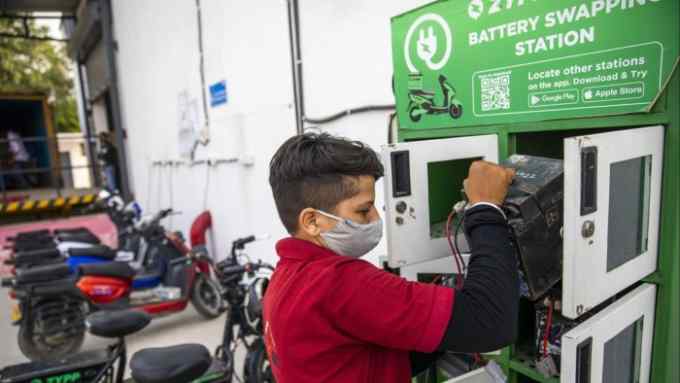Zypp Electric rides India’s growing EV market to top FT ranking

Simply sign up to the Asia-Pacific companies myFT Digest -- delivered directly to your inbox.
Northern India’s suffocating, toxic air was a big factor in Akash Gupta’s decision to quit his decade-long climb up the corporate ladder and start a last-mile electric vehicle logistics company.
Wanting to help pare back India’s noxious smog “was the biggest trigger for me”, he explains. He was also increasingly bored with working for others, after stints at telecoms operator Bharti Airtel and tech company Dell, having harboured a childhood dream, since his schooldays in Jaipur, to run his own business.
Inspired by China’s rising electric mobility, Gupta convinced his wife Rashi Agarwal, who ran a fashion business, to help him co-found Zypp Electric in 2017.
But, “it was definitely not an easy call” to leave a steady income, he admits. The decision to wind down Agarwal’s business, “which was earning well for both of us”, to focus on their new venture, was “tough”.
After a few failures — including a bike sharing idea that the couple abandoned within four months after realising it wouldn’t scale — they built a fleet of electric scooters and gig riders, in response to requests from companies for zero-emission deliveries. They have since bolstered that roster from an initial 300 vehicles to about 20,000, pushing Zypp to the top of the FT-Statista ranking of high-growth companies in Asia-Pacific.
Zypp is part of India’s nascent, but proliferating, electric vehicle industry. In terms of domestic EV output, the country is still well behind China, which has become a global industry leader. However, start-ups, overseas automakers, and Indian business groups are aiming to close the gap.

In March, Sajjan Jindal, chair of India’s largest steel producer JSW, told the Financial Times that the conglomerate plans to invest $5bn by 2030 to manufacture and sell MG-branded EVs in India, in a joint venture with China’s SAIC Motor.
India’s best-selling carmaker, Maruti Suzuki, expects to start building and exporting EVs this year, while Vietnam’s VinFast has announced a $500mn investment in an electric auto plant in India’s south-east.
Zypp has found its own niche, providing a technology platform and distinctive green scooter network to manage and run deliveries for global companies including Amazon, DHL and Uber, as well as Indian food takeaway businesses Swiggy and Zomato.
The company has, so far, drawn $35mn in investment from the likes of Goodyear Ventures and Gogoro, the Taiwanese electric scooter and battery-swapping provider.
Zypp’s revenue reached about $15mn in 2022, thanks to compound annual growth of 396 per cent in the previous three years. The company, based in the New Delhi satellite city of Gurugram, says annual revenue now stands at about $40mn and the business is operationally profitable.
Still, India’s EV take-off has so far been sluggish, in part because combustion-engine vehicles remain much more affordable than their EV counterparts in a country where average incomes are relatively low.
Infrastructure is also problematic, with just over 8,700 public charging stations in the world’s most populous nation. The government aims to expand the charging network to 22,000 this year, but that still undershoots China’s near-2mn stations.

“Fleet owners and the commercial vehicle sector still face challenges around higher upfront costs for EVs as well as finding appropriate sources of financing,” says Abhishek Poddar, India country head at global financial services provider Macquarie Group. “They worry about technology risk and the need to upskill their staff in order to install infrastructure and manage vehicle charging.”
India’s government has set targets to increase the proportion of electric motor sales to 30 per cent of all private cars and 80 per cent of two and three-wheelers by 2030, a large jump from current market shares of 1.3 per cent and 5 per cent respectively.
“India wants to be a regional, and even global, EV player,” says one lawyer who advises the government and EV companies. Even though China dominates, “India still has a massive enough domestic market to cater to.”
New Delhi announced a four-month $60mn subsidy scheme in March to help promote the sale of two and three-wheel EVs, and e-rickshaws — offsetting the end of an earlier multiyear incentive programme.

That same month, India also lowered import taxes on some EVs produced by automakers committing to invest $500mn and planning to start domestic manufacturing within three years. The move was seen as a lobbying win for Elon Musk’s Tesla Motors as it eyes entry into India’s market.
A new government, after elections in June, is expected to announce further EV subsidies, according to Nomura analysts.
“What I hear from all the large players is that there is still room for us to continue some subsidies at least for the next two years, if not more, so that electrification picks up,” says Gupta.
Zypp’s own plans include bolstering its fleet to 100,000 scooters within 18 months as it expands beyond its footholds in Bengaluru, Mumbai, Hyderabad, and the capital region surrounding New Delhi. Gupta says Zypp may branch out internationally.
Though Indian tech start-ups are struggling to raise funding in a globally high interest rate environment, Zypp aims to draw $300mn, spread across two rounds over the next three years, to finance its expansion.
“There is an appetite for electrification,” says Gupta. “For the right business models and the right disruption, the capital will always be available.”

Comments